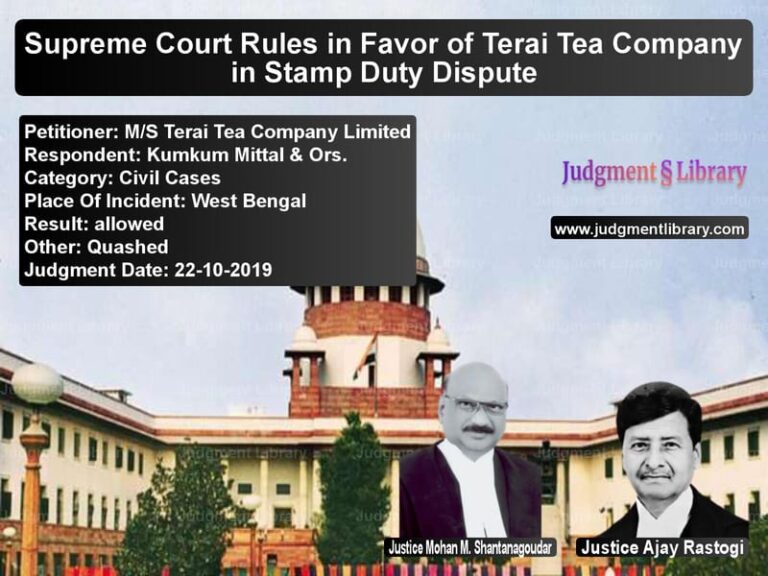Supreme Court Ruling on Mining Leases: Compensation for Obstructed Period
The case of Dharmendra Kumar Singh vs. The State of Uttar Pradesh & Others is a landmark judgment addressing the rights of mining leaseholders affected by government-imposed restrictions. The Supreme Court had to determine whether mining leases should be extended for the obstructed period due to a ban on mining operations in eco-sensitive areas or whether compensation should be awarded instead.
Background of the Case
In 2016, the National Green Tribunal (NGT) received a petition from the All India Kaimur People’s Front (AIKPF) demanding an immediate ban on mining in the eco-sensitive zones surrounding the Kaimur Wildlife Sanctuary in Sonbhadra, Uttar Pradesh. In response, the Ministry of Environment, Forest and Climate Change (MoEFCC) issued a notification on March 20, 2017, declaring the area as an Eco-Sensitive Zone (ESZ).
Despite this notification, mining operations continued under previously granted leases. However, in July 2018, the NGT directed the Uttar Pradesh government to immediately stop all mining activities in these notified areas. This led to the suspension of several mining leases, including those held by the appellants.
Key Legal Issues
- Whether mining leases that were suspended due to government orders should be extended for the obstructed period.
- Whether leaseholders were entitled to compensation for the losses suffered due to the suspension of their operations.
- Whether the Uttar Pradesh Mining Rules allowed for an extension of leases beyond their original term.
- Whether Rule 68 of the Uttar Pradesh Minor Minerals (Concession) Rules, 1963, provided any relief for affected leaseholders.
Arguments by the Petitioner
The petitioners, a group of leaseholders including Dharmendra Kumar Singh, argued that:
- The government’s actions had arbitrarily disrupted their lawful mining operations.
- They had received proper leases under legal provisions, and the government should either extend their lease period or compensate them for the loss.
- The delay in issuing a Section 20 notification under the Forest Act caused unnecessary hardship.
- The government had granted similar extensions in other cases, which should also apply here.
- The government was liable to compensate leaseholders under the principle of Actus curiae neminem gravabit (an act of the court shall prejudice no one).
Arguments by the Respondent
The Uttar Pradesh government countered:
- The mining suspension was a result of judicial intervention and environmental concerns, not arbitrary government action.
- There was no provision in the Mining Rules for extending leases due to external disruptions.
- The state was only liable to refund the lease amount for the period when mining was not allowed, not to extend leases.
- All future mining leases were to be granted through an e-auction system, making lease extensions infeasible.
Supreme Court’s Observations
1. No Automatic Extension of Leases
The Court ruled that the Uttar Pradesh Mining Rules did not provide for automatic lease extensions in case of government-imposed disruptions. It emphasized:
“Mining leases must be granted or extended in accordance with statutory provisions. The mere fact that operations were obstructed due to legal interventions does not create a right to automatic extension.”
2. Right to Compensation
The Court acknowledged that leaseholders had suffered financial losses due to the state’s inaction in issuing timely notifications. It ruled:
“The government’s failure to issue a Section 20 notification in a timely manner resulted in unnecessary hardship to the leaseholders. They are entitled to a refund of the lease amount for the obstructed period, along with interest.”
3. Interest on Refunds
The Court directed the Uttar Pradesh government to refund security deposits and advance royalties with interest:
- Security deposits: If not already refunded, to be returned with simple interest of 9% per annum.
- Advance royalties: To be refunded with 9% interest per annum from the date mining was stopped (either August 29, 2018, or February 5, 2019).
Final Judgment
The Supreme Court held:
- The petitioners were not entitled to an extension of their leases.
- The Uttar Pradesh government must refund lease payments for the obstructed period with 9% interest.
- Refunds must be processed within two months of the judgment.
Implications of the Judgment
For Leaseholders:
- Mining leaseholders cannot claim automatic extensions due to judicial or government-imposed restrictions.
- They can seek compensation in the form of refunded lease payments.
For Government Authorities:
- Governments must issue timely notifications to avoid unnecessary legal disputes.
- Future mining leases will be granted strictly through an e-auction process, ensuring transparency.
Conclusion
The Supreme Court’s ruling in this case clarifies the legal framework governing mining leases in eco-sensitive areas. It balances environmental concerns with the rights of leaseholders, ensuring fair compensation while upholding regulatory standards.
Petitioner Name: Dharmendra Kumar Singh.Respondent Name: The State of Uttar Pradesh & Others.Judgment By: Justice Sanjay Kishan Kaul, Justice Hrishikesh Roy.Place Of Incident: Sonbhadra, Uttar Pradesh.Judgment Date: 28-10-2020.
Don’t miss out on the full details! Download the complete judgment in PDF format below and gain valuable insights instantly!
Download Judgment: Dharmendra Kumar Sin vs The State of Uttar P Supreme Court of India Judgment Dated 28-10-2020.pdf
Direct Downlaod Judgment: Direct downlaod this Judgment
See all petitions in Environmental Cases
See all petitions in Damages and Compensation
See all petitions in Judgment by Sanjay Kishan Kaul
See all petitions in Judgment by Hrishikesh Roy
See all petitions in allowed
See all petitions in supreme court of India judgments October 2020
See all petitions in 2020 judgments
See all posts in Environmental Cases Category
See all allowed petitions in Environmental Cases Category
See all Dismissed petitions in Environmental Cases Category
See all partially allowed petitions in Environmental Cases Category







